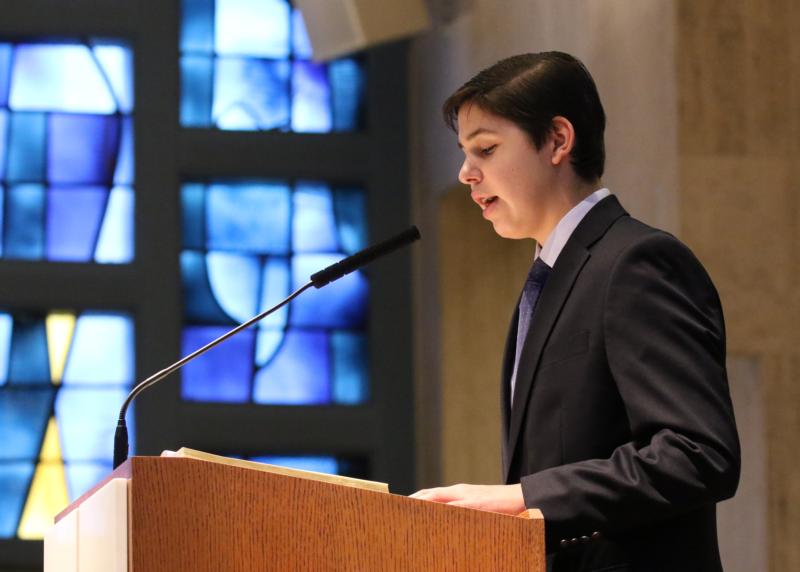
Lector Keith DeStaebler reads during Mass at St. Anne Church in Garden City, N.Y. With the promulgation of the Second Vatican Council’s Constitution on the Sacred Liturgy, two readings in English, along with the responsorial psalm were to be read at Sunday Mass, and laypeople were now allowed to proclaim those readings. (CNS photo/Gregory A. Shemitz)
I began my service as a lector in 1965 when I was 12 years old. Only a few months before (on Nov. 29, 1964), Masses were celebrated in English for the first time in the United States. So, you could say that I got my start on the ground floor.
Prior to the Second Vatican Council, the readings at Mass were done only by the priest, who would read the epistle and Gospel first in Latin, and then usually reread the Gospel in English. On more solemn occasions, the epistle would sometimes be read chanted by a man who had received the order of lector, one of the steps required for priestly ordination.
(See a related video.)
With the promulgation of Vatican II’s Constitution on the Liturgy (“Sacrosanctum Concilium,” Dec. 4, 1963), two readings in English, along with the responsorial psalm, were to be read at Sunday Mass, and lay people — men and women — were now allowed to proclaim those readings.
At St. Clement Parish School in the Archdiocese of Louisville, Kentucky, we went to Mass two or three times a week and I was chosen to “be a reader” for one of those school Masses. I don’t remember the occasion, but I can still recall the special sense of honor I felt in reading the word of God aloud in public.
[hotblock]
After more than 50 years serving in this ministry I can say that I feel that same sense of honor each time I proclaim God’s word.
As a seminarian, I had the opportunity to experience excellent lectors — each reader, it seemed, was better than the one heard the day before — and to study with people who were professional preachers and even with some who were professional actors.
From them I learned the importance of proclaiming words slowly and carefully — so that each could be understood by everyone — but also with power and passion so that the words would come alive in the minds of those who heard them. These were all valuable lessons to learn.
After I decided to leave the seminary, I continued to serve as a lector whenever I could. Over the years I have also served as an extraordinary minister of holy Communion and as a cantor leading the congregation in song, but proclaiming the word remains my first love.
Each week, whether I’m scheduled to lector or not, I prepare for Sunday Mass by reading and reflecting on the two readings, responsorial psalm and Gospel. I often read the words aloud to get a feel for them and to see how they sound in my head.
[tower]
Do they come lightly off of my tongue or do I stumble over them? Proclaiming the writings of St. Paul so they can be understood by the congregation can be difficult because of the many tongue twisters found there.
When I’m unfamiliar with a word or unsure of how a word should be pronounced, I look it up and then practice saying it aloud until I feel comfortable.
Next, I try to understand how the reading fits into the broader New or Old Testament reading from which it is taken. Knowing the context of a passage — for example, whether it is part of an introductory section or taken from the main body of the text — can make a difference in its meaning and how it should be read aloud.
Only when I feel confident with the Old and New Testament readings do I move on to the Gospel to see how the readings fit together.
One Saturday night after Mass when I had served as lector, I was standing in line at a fast-food restaurant waiting to order. A person whom I recognized from the parish but did not know came up to me and thanked me for making the readings come alive for them. That’s my goal each time I lector: not to be thanked, but to make the readings come alive for those who hear me.
***
Mulhall is a catechist living in Louisville, Kentucky.
PREVIOUS: Week-long work goes into homily prep for, and with, parishioners
NEXT: In Mass, Word of God comes through clergy and people


After watching the embedded video, I was struck by the fact that the interviewee says, “[G]et the Word of God off of the altar,” not just once, but twice. According to her, this is necessary for the conversion and support of souls. (See 1:42-1:52.) Yet I wonder if she, or anyone else for that matter, truly believes this.
Immediately after the first time she makes this rather conspicuous statement, the video (without any hint of irony or self-awareness) cuts to a shot of the inside of an almost-empty church where Mass is about to begin. (See 0:56-1:06.) What’s actually ironic, though, is that the congregants we see in this shot all appear to have been alive before Sacrosanctum Concilium (and most likely well before).
The author of this piece fails to note that for the past 50-plus years of special honor he has experienced as the result of being “allowed” to “proclaim” the readings during the sacred liturgy, Mass attendance, vocations to the priesthood and religious life, and sacramental marriage within the Church have all been declining rather steadily.
We all know Einstein’s famous definition of insanity (doing the same thing over and over and expecting a different result each time). Maybe it’s time to admit we’re insane and then return to the form of worship that don’t involve taking the Word of God off of the altar, as our Lord intended.